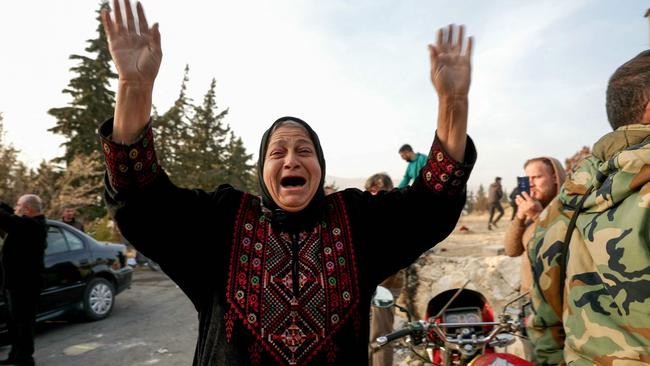Syrian rebels vow to hunt down Assad’s torturers
Rebel leader Abu Mohammed al-Jolani has announced the new authorities will ‘hold accountable the criminals, murderers, security and army officers’ responsible for torturing Syrians.

Syria’s Islamist rebels have vowed to hunt down former senior officials “involved in torturing the Syrian people”, as their leader prepares to transfer power after a half-century of brutal rule.
Just days after seizing Damascus and forcing president Bashar al-Assad to flee, Abu Mohammed al-Jolani – now using his real name Ahmed al-Sharaa – said incoming authorities would not hesitate “to hold accountable the criminals, murderers, security and army officers” who had tortured Syrians for decades.
He said his Hayat Tahrir al-Sham Islamist group “will pursue war criminals and ask for their handover from the countries to which they fled”.
“We have affirmed our commitment to tolerance for those whose hands are not stained with the blood of the Syrian people, and we have granted amnesty to those who were in compulsory service,” Mr Jolani said.
How Assad might face justice remains unclear, especially after the Kremlin refused on Monday to confirm reports by Russian news agencies that he had fled to Moscow.
Kremlin spokesman Dmitry Peskov, however, said if Russia granted asylum to Assad and his family, this would be a decision taken by President Vladimir Putin.
The Syrian embassy in Moscow raised the opposition’s flag, and the Kremlin said it would discuss the status of its bases in Syria with the new authorities.
Assad’s ruling Baath party said it would support the country’s transition phase.
Neighbouring Israel wasn’t waiting for any transition, however, sending missiles over the border and destroying “the most important military sites”, according to the Syrian Observatory for Human Rights.
Israel had sent troops into a buffer zone on the east of the Israeli- annexed Golan Heights after Assad’s fall, in what Foreign Minister Gideon Saar described as a “limited and temporary step” for “security reasons”.
It had also carried out “about 250 airstrikes on Syrian territory” since Sunday with the aim of destroying the former regime’s military capabilities, according to the Syrian Observatory.
“Israel destroyed the most important military sites in Syria, including Syrian airports and their warehouses, aircraft squadrons, radars, military signal stations, and many weapons and ammunition depots in various locations in most Syrian governorates,” the Britain-based observatory said.
Mr Jolani earlier met outgoing prime minister Mohammed al-Jalali and discussed the “transfer of power”. Mr Jalali said on Sunday he was ready to “co-operate” with any leadership chosen by the people and for any handover process, after the lightning offensive that forced the downfall of Syria’s government at the weekend.
A short video of the meeting showed it was also attended by Mohammed Bashir, who heads the rebels’ “Salvation Government” in their northwest Syria bastion, and is the most likely candidate for prime minister in the transitional administration.
German Chancellor Olaf Scholz and French President Emmanuel Macron also agreed to co-operate with Syria’s new leaders in the interests of “preserving Syria’s territorial integrity and sovereignty”.
“Both agreed that they were ready to co-operate with the new leadership on the basis of fundamental human rights and the protection of ethnic and religious minorities,” the German chancellery said.
The two countries, along with Britain, Italy and several other European countries, said they would freeze all pending asylum requests from Syrians.
Austria signalled it would soon deport refugees back to Syria, while far-right politicians elsewhere made similar demands, including in Germany – home to Europe’s largest Syrian community – at a time when immigration has become a hot-button issue across the continent.
Meanwhile, thousands of Syrians gathered outside a jail synonymous with the worst atrocities of Assad’s rule to search for relatives, many of whom have spent years in the notorious Saydnaya jail outside Damascus.
Rescuers from the Syrian White Helmets group had earlier said they were looking for potential secret doors or basements in Saydnaya but later called off the search.
Aida Taha, 65, said she had been “roaming the streets like a madwoman” in search of her brother, who was arrested in 2012.
“We’ve been oppressed long enough. We want our children back,” she said.
In central Damascus on Monday, despite all the uncertainty over the future, the joy was palpable.
“It’s indescribable. We never thought this nightmare would end. We are reborn,” Rim Ramadan, 49, a civil servant at the finance ministry, said.
“We were afraid for 55 years of speaking, even at home. We used to say the walls had ears,” Ms Ramadan said, as people honked car horns and rebels fired their guns into the air.
“We feel like we’re living a dream,” she said.
AFP





To join the conversation, please log in. Don't have an account? Register
Join the conversation, you are commenting as Logout